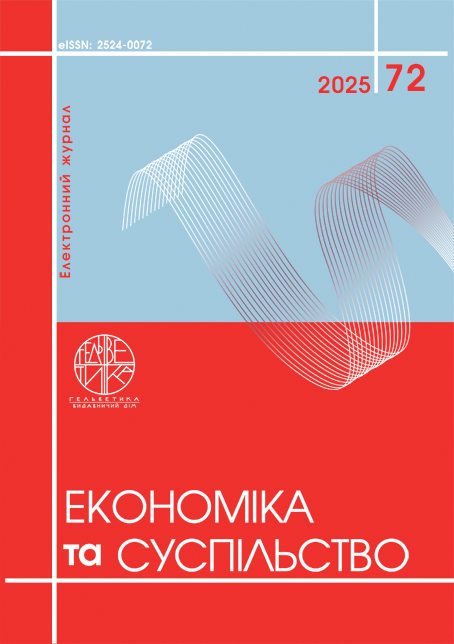PSYCHO-EMOTIONAL ASPECTS OF THE CONSUMER DECISION-MAKING PROCESS
Abstract
The article explores the psycho-emotional determinants of consumer decision-making in the context of growing informational complexity. Emphasis is placed on the limitations of traditional rational-choice models, which inadequately account for affective, cognitive, and motivational processes underlying consumer behavior. The study substantiates the integrative influence of internal determinants, structured across two interconnected levels: the physiological-somatic and the psycho-emotional. The former includes visceral states – such as hunger, pain, or arousal – that act as powerful behavioral activators, often bypassing deliberative reasoning. Particular attention is given to the concept of visceral influences and the empathy gap, which explains the inconsistency between decisions made in “cold” (rational) states versus those in “hot” (emotionally aroused) states. The psycho-emotional level encompasses cognitive biases, affective triggers, motivational attitudes, and the overall psychological well-being of the individual. Cognitive distortions are examined as mechanisms that simplify decision-making at the cost of rational evaluation. Emotional triggers are analyzed as stimuli that shape perception and accelerate behavioral responses, while motivational structures are shown to be susceptible to distortion under emotional pressure. The concept of self-awareness is introduced as a regulatory mechanism that enables reflection on internal states and thus enhances behavioral self-regulation. Additionally, the role of emotional memory is emphasized as a stabilizing factor that encodes affect-laden consumption experiences and reinforces habitual patterns of choice. The study also highlights the impact of mental health disorders on consumer decision-making. Conditions such as stress, anxiety, and depressive states are shown to impair cognitive flexibility, disrupt emotional regulation, and reshape motivational hierarchies, leading to impulsive, avoidant, or compensatory consumption patterns. In conclusion, consumer behavior is conceptualized as a dynamic system shaped by the interaction of physiological, emotional, cognitive, and reflective components, requiring a multidisciplinary analytical framework for its adequate understanding.
References
Канеман Д. Мислення швидке й повільне. Переклад із англійської. Київ: Наш Формат, 2017. 480 с.
Maslow A.H. Motivation and Personality. Longman, 1987. 336 p.
Frederic S., Loewenstein G., O'Donoghue T. Time Discounting and Time Preference: a Critical Review. Journal of Economic Literature. 2002. Vol. 40. №2. Pp. 351-401. DOI: 10.1257/002205102320161311.
Loewenstein G. Hot-Cold Empathy Gaps and Medical Decision Making. Health Psychology. 2005. Vol. 24. №4. Pp. 49-56. DOI: 10.1037/0278-6133.24.4.S49.
Damasio A. Somatic Markers and the Guidance of Behavior. Oxford University Press, 1991. Pp. 217-299.
Russell C.A., Russell D.W., Harris C. Post-traumatic consumption: Does emotion regulation moderate the relationship between military life stressors, mental health outcomes, and compulsive buying? The Journal of Consumer Affairs. 2023. Vol. 57. №3. Pp. 1183-1212. DOI: 10.1111/joca.12519.
Ree M.J., Harvey A.J. Interpretive Biases in Chronic Insomnia: an Investigation Using a Priming Paradigm. Behavior Therapy. 2006. Vol. 37. №3. Pp. 248-258. DOI: 10.1016/j.beth.2006.03.002.
Ottaviani C., Watson D.R., Meeten F., Makovac E., Garfinkel S.N., Critchley H.D. Neurobiological substrates of cognitive rigidity and autonomic inflexibility in generalized anxiety disorder. Biological Psychology. 2016. Vol. 119. №1. Pp. 31-41. DOI: 10.1016/j.biopsycho.2016.06.009
Beevers C.G. et al. Association between negative cognitive bias and depression: a symptom-level approach. Journal of Psychopathology and Clinical Science. 2019. Vol. 128, №3. Pp. 212-227. DOI: 10.1037/abn0000405.
Kakoschke N., Aarts E., Verdejo-Garcia A. The Cognitive Drivers of Compulsive Eating Behavior. Frontiers in Behavioral Neuroscience. 2019. Vol. 12, №338. Pp. 1-8. DOI: 10.3389/fnbeh.2018.00338.
Isaksson M., Ghaderi A., Wolf-Arehult M., Ramklint M. Overcontrolled, undercontrolled, and resilient personality styles among patients with eating disorders. Journal of Eating Disorders. 2021. Vol. 9, №47. Pp. 1-9. DOI: 10.1186/s40337-021-00400-0.
Kahneman D. (2017). Myslennia shvydke y povilne [Thinking, Fast and Slow]. Kyiv: Nash Format, 480 p. (in Ukrainian)
Maslow A.H. Motivation and Personality. Longman, 1987. 336 p.
Frederic S., Loewenstein G., O'Donoghue T. Time Discounting and Time Preference: a Critical Review. Journal of Economic Literature. 2002. Vol. 40. №2. Pp. 351-401. DOI: 10.1257/002205102320161311.
Loewenstein G. Hot-Cold Empathy Gaps and Medical Decision Making. Health Psychology. 2005. Vol. 24. №4. Pp. 49-56. DOI: 10.1037/0278-6133.24.4.S49.
Damasio A. Somatic Markers and the Guidance of Behavior. Oxford University Press, 1991. Pp. 217-299.
Russell C.A., Russell D.W., Harris C. Post-traumatic consumption: Does emotion regulation moderate the relationship between military life stressors, mental health outcomes, and compulsive buying? The Journal of Consumer Affairs. 2023. Vol. 57. №3. Pp. 1183-1212. DOI: 10.1111/joca.12519.
Ree M.J., Harvey A.J. Interpretive Biases in Chronic Insomnia: an Investigation Using a Priming Paradigm. Behavior Therapy. 2006. Vol. 37. №3. Pp. 248-258. DOI: 10.1016/j.beth.2006.03.002.
Ottaviani C., Watson D.R., Meeten F., Makovac E., Garfinkel S.N., Critchley H.D. Neurobiological substrates of cognitive rigidity and autonomic inflexibility in generalized anxiety disorder. Biological Psychology. 2016. Vol. 119. №1. Pp. 31-41. DOI: 10.1016/j.biopsycho.2016.06.009
Beevers C.G. et al. Association between negative cognitive bias and depression: a symptom-level approach. Journal of Psychopathology and Clinical Science. 2019. Vol. 128, №3. Pp. 212-227. DOI: 10.1037/abn0000405.
Kakoschke N., Aarts E., Verdejo-Garcia A. The Cognitive Drivers of Compulsive Eating Behavior. Frontiers in Behavioral Neuroscience. 2019. Vol. 12, №338. Pp. 1-8. DOI: 10.3389/fnbeh.2018.00338.
Isaksson M., Ghaderi A., Wolf-Arehult M., Ramklint M. Overcontrolled, undercontrolled, and resilient personality styles among patients with eating disorders. Journal of Eating Disorders. 2021. Vol. 9, №47. Pp. 1-9. DOI: 10.1186/s40337-021-00400-0.

This work is licensed under a Creative Commons Attribution 4.0 International License.


